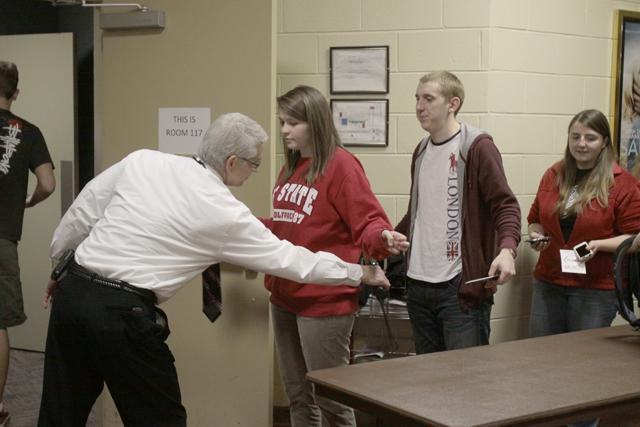 " />
" />
Technician
Photo by Technician. Asia Buss, a sophomore in psychology, is scanned by the N.C. State police at Dirty Bingo on Tuesday Feb. 12 2013. The goal of the program was to educate students about sex. "I came because I heard about it from a friend," Buss said, "I think it will be fun".
After much controversy, the Dirty Bingo event hosted by the Union Activities Board, went off without a hitch Tuesday night. Originally marked as an event to protest, students let the event take place without any complications once the board made changes to the specifics of the event.
Once the controversy reached higher media attention, the Union Activities Board was informed that bingo laws prohibit giving away prizes worth more than $10, so it reformed the prospective prizes.
Due to the gratuitous amount of complaints, the Union Activity Board ended up spending more money to have attendees wanded as they entered the auditorium.
Originally, the prize repertoire contained a wide variety of sex toys including, “a few edible undergarments, Fifty Shades of Grey book and game, six vibrators, four surprise packs, three dildos, a toy cleaner, lube, a sex game, a sex position book, an anal plug and a booty booster,” according to Union Activity Board President Lauryn Collier in an official memorandum issued on Tuesday, Jan. 7th.
“The purpose of the event was to provide a new and innovative way to address sex education,” said Collier, a senior majoring in animal science and criminology. “It also addressed practicing healthy sexual behaviors both with oneself and with a partner.”
Many students responded in outrage that their student fees were used to purchase such risqué, non-academic items. Jason Cockrell, a senior in applied mathematics, created a Facebook page protesting the event before certain details about the event were changed.
The board spent approximately $304 on the prizes, which is less than one penny from each student.
Emma Benson, a senior in business administration and state co-chair of Young Americans for Liberty, was one of those planning to protest the event.
“I have no problem with the event, just the fact that student fees were paying for it,” Benson said. “We were concerned about cutting back costs, given the economy.”
Students like Carmen Cubilla, a senior in biology, were excited about the idea and purpose of Dirty Bingo.
“I feel like our generation doesn’t know how to talk about sex,” Cubilla said. “I think the people against the event don’t realize that the toys can be utilized in a positive way. Sex is biological and it’s going to happen. It should be regarded as healthy.”
After listening to various responses from concerned students and media outlets, the activities board altered its plans for the event. An anonymous source donated almost $300 to cover the expenses so that student fees did not support the event in any way, Collier reported.
“We found that the student fees were the biggest problem and since we solved the problem, many students have expressed their appreciation,” said Collier.
In regard to the budget, Collier assured students that the board is not an organization that recklessly spends the $15 in student fees that are received each year.
As if the possibility of a protest wasn’t enough to deal with, the board had to alter its prize inventory a second time because it did not have a proper bingo license. North Carolina has a law which prevents those without bingo licenses to give away prizes worth more than $10.
After shaving down its inventory, the board gave away sex-related prizes such as edible underwear and KY products as well as non-sexual items like t-shirts, Target gift cards, koozies and other items, according to Collier.
The removed toys could not be returned, according Collier.
“[The UAB] will have to work together to see what the best option will be. We haven’t decided if we want to host another event. It’s not in stone,” Collier said.
Local news stations such as ABC11 and various other blogging websites covered the controversy, bringing a lot of negative attention to the event.
In the future, Collier encourages students bring their concerns directly to the board instead of the media, to prevent unnecessary stress.